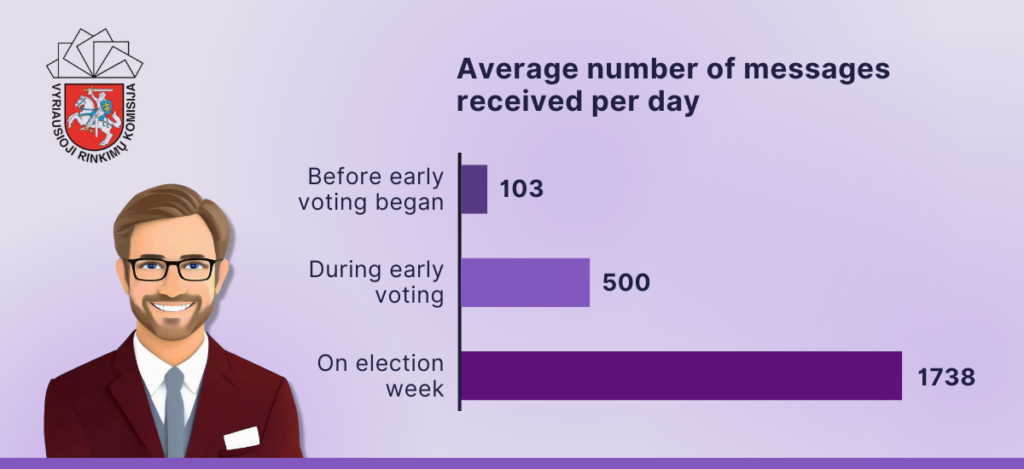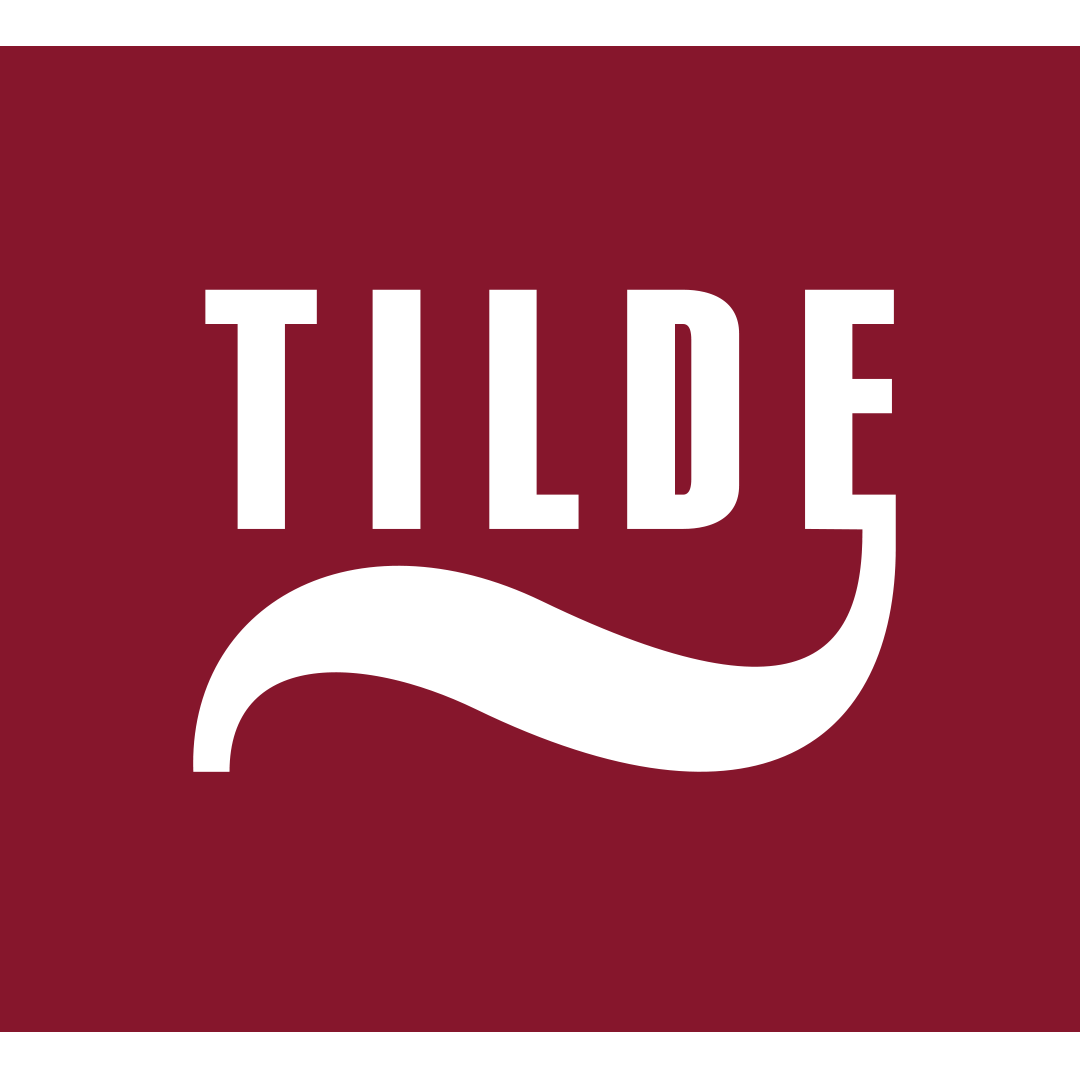During this year’s presidential elections, the officials from the Central Electoral Commission (Vyriausia rinkimų komisija – VRK) were not the only ones answering a variety of questions from voters, candidates, parties, and commissions across Lithuania. A couple of months ago, a smart AI-driven chatbot was deployed for VRK so it could assist with incoming queries as well. VRK reported that the top ten most popular questions asked even included the question of who to vote for.
Client: VRK (Central Electoral Commission of the Republic of Lithuania)
Industry: Election administration
Challenge
“During election time, together with other colleagues from VRK, we start performing administrative work from around 6 p.m. when the calls from voters stop,” says Lina Petronienė, Chair of VRK. “It is simply not physically possible to deal with the organisational issues of the elections and communicate with voters or political campaigners at the same time, despite the fact that both functions are very important. This is why the idea was born to deploy an intelligent AI chatbot, as it would allow voters to get the answers they need as quickly as possible.”
Collaboration with Tilde
“Initially, we were interested in and analysed how chatbots work in other institutions. We tried products from foreign companies but we saw too many risks of the robot not being able to provide accurate information. Partnering with Tilde to create VRK’s virtual colleague proved to be the most appropriate and reliable option,” says Lina Petronienė.
Development
According to Renata Špukienė, Head of Tilde in Lithuania, the development and deployment of AI products for public institutions is a job that entails great responsibility. She states that accuracy of information is especially important here. Issues can arise if a person asks a question to any public authority and the chatbot provides an incorrect or less accurate answer. There are many examples of this around the world. This is why Tilde worked very actively and closely with the Commission team in developing the robot for VRK. They wanted it to be operational before the elections, and for it to be able to understand and answer a wide range of questions with the utmost accuracy. R. Špukienė reveals that the involvement of the VRK team was exemplary: they were able to identify a great deal of potential risks and find solutions to them; they constantly checked the robot’s performance, corrected any errors that occurred, and trained it to answer new questions.
Solution
Once developed and deployed, the VRK chatbot was able to reduce the workload of VRK staff due to its 24/7 availability, its capacity to quickly generate answers, and its large knowledge base.
According to Lina Petronienė, VRK has a wealth of information relevant to the public, and sometimes just presenting it all on the website is a challenge.
“In the office, we jokingly argue about whose information is more important and which is more necessary to publish on the front page of the website. We have to provide a lot of time-sensitive information to voters, candidates, political parties and commission members, of which there were, for example, around 15,000 in Lithuania during the presidential elections. We can now see that the chatbot is already doing a good job of providing answers: it has a large amount of knowledge about the elections in its virtual brain, voters are happy to communicate with it, and it’s available at any time of day to provide answers or links to more detailed information.
We had a funny situation recently: one morning, we found an overnight email in our email inbox from a Lithuanian embassy that helps us organise voting abroad. The email said that colleagues on the other side of the world had “consulted” our robot during the night, received a reply and were able to get on with their work.”
Focus on cybersecurity
Mindaugas Mizaras, Advisor of the Training and Communication Division of VRK, states that they paid much attention to cybersecurity when developing the chatbot. VRK worked seriously with Tilde experts to protect the virtual colleague from cyber aggressors. There were concerns that the robot could provide a misleading answer, which could even result in a court case, as election-related information is extremely sensitive. M. Mizaras claims that they have not experienced any incidents so far but have assessed the risks, are constantly working to avoid them, and they know that the Tilde team is always ready to help.
Renata Špukienė adds to this by saying that cybersecurity is always a top priority when implementing AI technologies: “We live in tense times, and cyberspace has become one of the fronts, even in places where there is no direct war going on. This is why we pay particular attention to cyber security when implementing technology solutions for public and private organisations. Tilde solutions are not only used in Lithuania, Latvia and Estonia but also in other EU countries and their public organisations, so we have extensive experience and knowledge of how to deal with cyber security challenges.”
Results
The VRK chatbot, which was launched on 18 March, has had almost 5000 visitors, 4422 conversations and 9852 messages during this period. It is interesting to note the difference in the use of the chatbot before and after the elections: according to VRK, from 18 March until the early voting in the presidential elections, the chatbot received on average about 103 messages per day; after the early voting started, this number began growing rapidly, reaching 500 messages per day, and during the election week, the VRK robot handled many more queries, answering 1,738 messages per day on average.

Lina Petronienė, Chair of VRK, says that the robot has already paid for itself. “Imagine how long it would take a live colleague in the office to reply to such a large number of messages, and for the voter, getting an answer immediately is of most importance. Even though our chatbot is very young and still learning, I believe it will become even more competent in the future. Voters appreciate that it communicates in a friendly and non-bureaucratic way, and some are not aware that they are corresponding with artificial intelligence rather than a real person.”
Received questions
“Most of the questions are about general issues related to the presidential elections, the referendum and voting procedures: how to vote in advance, where to go on election day, and how to find the address of the polling station,” says Mindaugas Mizaras, an advisor to VRK’s Training and Communication Department, who has spent many hours working on the robot’s skill development.
He says that voters are interested in finding out whether they can vote abroad, at home, in hospital, or in a sanatorium. Interestingly, a number of people asked the chatbot who they should vote for. “Of course, when answering such questions, our robot politely invites them to read the candidates’ election programmes, watch the debates and make up their own minds,” says Mizaras.
Future plans
When asked about their future plans for the chatbot, VRK makes no secret of the fact that they have a lot of plans. As the robot can only handle queries in Lithuanian right now, they plan to teach the robot English, introduce new functionalities, and continuously expand the virtual colleague’s knowledge base.






